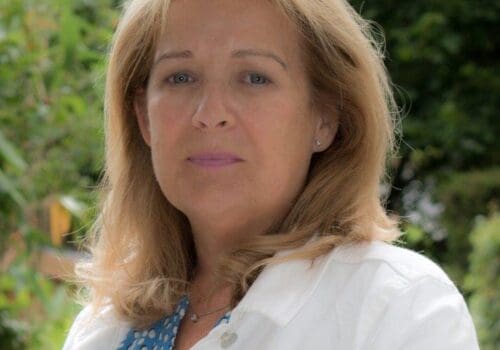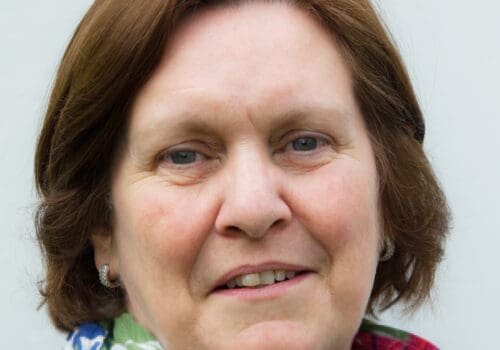Women who Inspire Dr Viorica Chelban – International Women’s Day
Our former Research Fellow, Dr Viorica Chelban shares with us the woman who inspired her as a young medical student
When I think of women who inspired me in the field of research I have to mention Marie-Germaine Bousser, who is Professor of Neurology at Paris Diderot University in France and former head of Neurology Department in Lariboisière Hospital in Paris, amongst many accolades. It was there at Lariboisière, where I had the chance to meet Prof Bousser in 2011 and learned of her most amazing career as a neurologist and scientist.
Her main interests are stroke and migraine. She has been President of the International Headache Society, a founder member of the European Stroke Conférence, Founder President of the French neurovascular society (Société Française neuro-vasculaire) and President of the French neurology society (Société Française de Neurologie). She was responsible for one of the earliest studies showing the beneficial effects of aspirin in the prevention of stroke. She identified a new hereditary cerebral arterial disease that she named CADASIL (Cerebral Autosomal Dominant Arteriopathy with subcortical infarcts and leukoencephalopathy), but most importantly, I appreciate her human side. She was friendly, knowledgeable, curious about every new case admitted to the hospital and equally curious about junior doctors, their interests and how to motivate them to achieve their own goals. She was playing tennis before coming into the hospital in the morning and being the on-call doctor for all the premiers at the Opera Garnier in Paris. I still aspire to those life goals!
One day, she told us the story of how she discovered CADASIL, a genetic condition, which she identified in 1993 in a single French family in collaboration with her co-worker geneticist Prof E. Tournier-Lasserve, and which is now known to affect over 600 families worldwide. He had a strange condition”, recalls Bousser. Soon after having had a stroke, Mr C showed signs of Binswanger’s disease—a small-artery disease associated with hypertension and dementia—but his blood pressure was normal. Prof Bousser enrolled Mr C in a clinical trial that she and her colleagues were running to investigate the efficacy of aspirin in preventing recurrent stroke and followed him closely. His condition progressively deteriorated, and his puzzling symptoms continued to trouble Prof Bousser for years.
The turning point came 9 years later when Mr C’s children came to Prof Bousser with similar symptoms. She told us that she realised then that this might be an unknown condition that ran in the family. In collaboration with Elisabeth Tournier-Lasserve, a Paris-based geneticist at INSERM (French National Institute for Health and Medical Research), Prof Bousser studied 57 adults of the family. In 1993, they mapped the mutated gene on to chromosome 19, and 3 years later, with their co-worker Anne Joutel, also at INSERM, they identified the gene as Notch3—a gene that had previously been thought to be expressed only in fruit flies. This has been a breakthrough in the understanding of small arteries diseases of the brain and of vascular dementia. I was mesmerised by her story, her perseverance and her “loyalty” to the patients, for not giving-up on unsolved cases, even when that took decades of work. I thought to myself that one day I wish I had a story like that to tell my children. I didn’t realise it then but meeting her has defined my future research career. Returning to London, I started working on rare neurological diseases, learning genetics, and looking after patients with rare conditions. Since then, together with my colleagues, I published two new disease-casing genes, for one of them we found a treatment that prevents the disease from worsening.
Prof Bousser was also among the first neurologists to raise awareness of stroke in women. In the early 1980s, aspirin was thought to be effective in decreasing stroke recurrence only in men. Prof Bousser’s study, however, showed that a similar efficacy of aspirin in decreasing stroke recurrence was also observed in women, something she was already clearly demonstrating since 1997. The first study on aspirin in the primary prevention of stroke in women was not published until 2005.
In addition to her clinical and academic excellence, it is perhaps also Prof Bousser’s compassion for patients and her courage and her persistence in working on neglected diseases and in campaigning for the health care of women that make me admire her.
Dr Viorica Chelban
Disclaimer: The views and opinions expressed in the blogs published on these pages are those of the authors and do not necessarily reflect the official policy or position of the MSA Trust.
Recent Posts

MSA Candlelight 2025
19 Jun 2025 | 2 comments

International Nurses Day 2025
12 May 2025 | 1 comment

